Frank Fay is an actor whose name has never been used here in the past and it’s rather doubtful that his name will come up again anytime soon after this reflection. He’s the star of 1931’s God’s Gift to Women and he is the gift, such as it is.
In this short little film he is Toto, a direct descendant of the famous Don Juan, writing his own tomes of wine and women- and more of the latter. As the film opens Toto enters a fine Parisian restaurant with several women in tow. Among them are Joan Blondell (in one of her earlier films) and Louise Brooks (in one of her rare talkies), but from across the room he locks eyes with Diane, played by Laura La Plante.
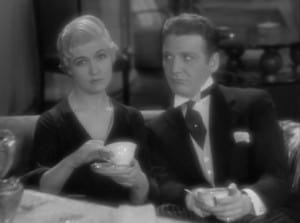 Diane’s father has, of course, heard of the Toto and his amorous ways, and he isn’t amused. Though Diane at first rebuffs Toto’s somewhat lecherous advances, she is quietly intrigued by him until love blossoms between them. In an attempt to stop things in their tracks, Toto is made a proposition.
Diane’s father has, of course, heard of the Toto and his amorous ways, and he isn’t amused. Though Diane at first rebuffs Toto’s somewhat lecherous advances, she is quietly intrigued by him until love blossoms between them. In an attempt to stop things in their tracks, Toto is made a proposition.
If Toto can stay away from all women and drink for six months, he can resume courting Diane at the end of the six months. He gleefully accepts the offer and as a matter of course gets an examination from her father’s doctor. He diagnoses an enlarged aorta which is at extreme risk of bursting. He recommends avoiding all women entirely even in platonic situations.
What ensues for most of the balance of the film is various plays on this theme. Toto hides in his mansion, having his staff cover paintings and nude sculptures to save him any potentially deadly excitement.
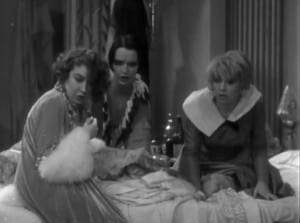 Later his three leading former girlfriends (Joan Blondell, Louise Brooks and Yola d’Avril) all come to his room to nurse him. As they arrive, Toto quickly dispatches them individually to various rooms and closets, with each of the ladies unaware of the presence of the other two. They eventually discover each other’s presence and a squabble takes place between all three on Toto’s bed. It sounds better than it is.
Later his three leading former girlfriends (Joan Blondell, Louise Brooks and Yola d’Avril) all come to his room to nurse him. As they arrive, Toto quickly dispatches them individually to various rooms and closets, with each of the ladies unaware of the presence of the other two. They eventually discover each other’s presence and a squabble takes place between all three on Toto’s bed. It sounds better than it is.
Finally Toto decides to through caution to the winds and kiss his beloved Diane, knowing the excitement will kill him. Yet when he does, nothing happens and the entire charade is exposed. Diane’s father put the doctor up to a quack diagnosis to see exactly how sincere Toto’s love for his daughter is.
Probably the greatest weakness of the movie now is the same as it was then: Frank Fay. There is simply too much of him and his skillset is too narrow to carry the film. It is very hard to get overly engaged with the same joke told in the same style for the better part of an hour.
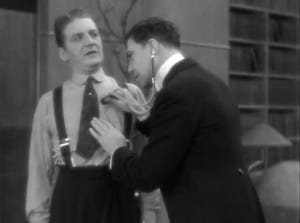 While the first part of the film shows promise as the scene is set, following Toto’s diagnosis it drags and feels tired. Early on, when Toto is less central, the plot moves and breathes and we are treated to director Michael Curtiz’s penchant for extras filling the frame- note the initial scene and also Toto and Diane’s meeting on the sidewalk for great examples of this.
While the first part of the film shows promise as the scene is set, following Toto’s diagnosis it drags and feels tired. Early on, when Toto is less central, the plot moves and breathes and we are treated to director Michael Curtiz’s penchant for extras filling the frame- note the initial scene and also Toto and Diane’s meeting on the sidewalk for great examples of this.
Later we are merely treated to Toto playing against various people in his mansion in various flavors of the same motif. By the time we get to his finale with Diane, we’ve already been through the doctor, his butler, Diane’s father, a surprise party, and the appearance of the three aforementioned nurses. By the time that kiss comes around, we’d just as not hope that it does prove fatal.
If you can stomach a quintuple dosage of Frank Fay, you’ll surely enjoy God’s Gift to Women. If you’re not a big fan, check it out for the random flashes of the rest of the cast, which are interesting if not compelling given their small roles.
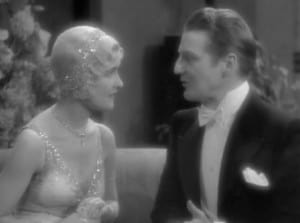 God’s Gift to Women is if nothing else a great showpiece of the industry’s transition to sound. We have holdovers from the silent era in Laura La Plante and Louise Brooks, an early and brief star of both vaudeville and Broadway (Frank Fay) and a hint of greatness to come in Joan Blondell.
God’s Gift to Women is if nothing else a great showpiece of the industry’s transition to sound. We have holdovers from the silent era in Laura La Plante and Louise Brooks, an early and brief star of both vaudeville and Broadway (Frank Fay) and a hint of greatness to come in Joan Blondell.
La Plante, who does a fine if uninspired portrayal here, has always been labeled as one of those actresses who proved unable to make the transition to sound. Though for most this came down to how one’s voice transferred to film, here is may have been something different, for her dialogue seems fine. Rather for LaPlante, Universal’s top star through 1930, it may have been her inability to tone down the exaggerated facial expressions she mastered for silent films.
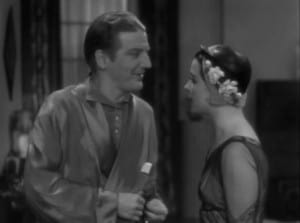 Louise Brooks also gets lumped into the bin of those unable to transition to sound, though her travails are a bit different. Unhappy with studio Paramount, she turned down a raise and fled to Germany, where she made a handful of films before returning to America in 1931. Though she too was labelled as having a voice which heard poorly on film, in truth her lack of concrete roles was more the result of a smear campaign put on by Paramount. Even in God’s Gift to Women her screen time is extremely limited, with her in only a few brief scenes and with even less dialogue.
Louise Brooks also gets lumped into the bin of those unable to transition to sound, though her travails are a bit different. Unhappy with studio Paramount, she turned down a raise and fled to Germany, where she made a handful of films before returning to America in 1931. Though she too was labelled as having a voice which heard poorly on film, in truth her lack of concrete roles was more the result of a smear campaign put on by Paramount. Even in God’s Gift to Women her screen time is extremely limited, with her in only a few brief scenes and with even less dialogue.
Frank Fay heard the critical notices he was given for the picture and realized things were about to get very different for him. Warners had used him in the same role of a lothario for a few years, highlighting his singing ability and his somewhat risqué brand of humor. Even before its release, the studio noted that audience tastes were changing and as a result they cut two songs from the picture. As the pre-code era closed so did Fay’s career, though he lingered for a bit in various parts.
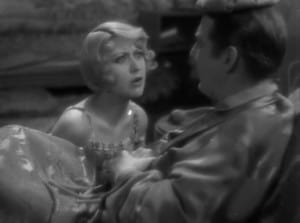 Only Joan Blondell’s star would be in the ascendency after God’s Gift to Women, though like Brooks she was given little to do. Unlike Brooks however, she does have a little more screen time and interaction with Fay and she makes the most of it.
Only Joan Blondell’s star would be in the ascendency after God’s Gift to Women, though like Brooks she was given little to do. Unlike Brooks however, she does have a little more screen time and interaction with Fay and she makes the most of it.
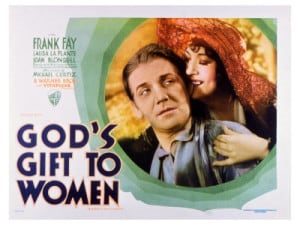
Having seen Fay’s work as an emcee (1929s “The Show of Shows”), I could see where he inspired, to a certain degree, Bob Hope and I came to the conclusion that a little of him would go a long way. I didn’t even make it to the end of “God’s Gift to Women”. Perhaps his acting adapted to the better script when he starred in the original production of “Harvey” on Broadway in the 1940s or else I can’t imagine the show being quite the hit it was with Fay as Elwood.